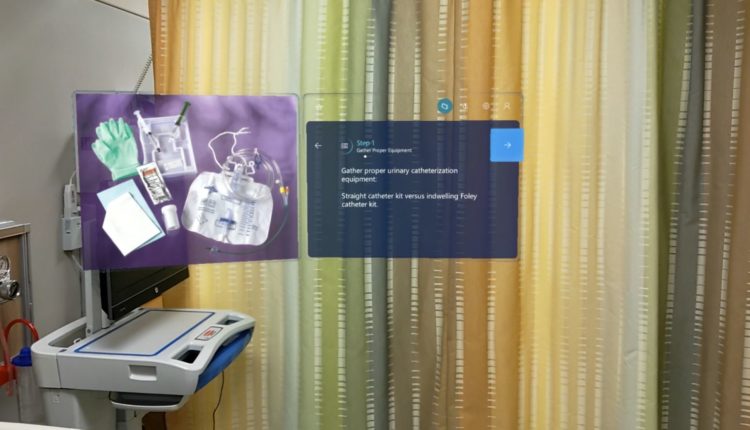The pandemic has profoundly impacted educators across the world. Video calling technology has enabled millions of classes to continue at a distance but, it has shortcomings when it comes to teaching hands-on skills. This fall, the School of Nursing at the University of Michigan turned to mixed reality and Microsoft Dynamics 365 Guides for an alternative solution to these new challenges.
Dynamics 365 Guides is a mixed reality application for Microsoft HoloLens that allows users to create step-by-step instructions in 3D. Guide authors use text, images, videos, and holographic content to help workers learn complex physical procedures.

“Once we were introduced to the Microsoft HoloLens () we learned about Dynamics 365 Guides, and it was pretty exciting because we did realize that we could use the guides to create training tools to teach the nursing students how to do these necessary, rudimentary, required skills, and procedures that they have to do in order to move to the next level and go out and practice.”Melissa Bathish, clinical assistant professor and center co-director and undergraduate faculty lead
Over the past few months, the Dynamics 365 Guides product development team collaborated with the School of Nursing to define a pilot to test how this new medium can help deliver a competency-based nursing curriculum. The aim is to create a program that standardizes the education students receive for each procedure, gives flexibility to both faculty and students by enabling the latter to be more independent in their learning, and by removing the location restrictions of in-person training.
Traditionally, students practice procedures on mannequins that resemble the human body and provide the haptic feedback of performing certain actions. Often, they struggle because the procedures can be very complex, with lots of steps and things to take care of simultaneously.

With Dynamics 365 Guides, students can go through a procedure one step at a time or as many times as they need. HoloLens shows them a holographic instruction card with directions overlaid in their space. Because the interface is hands free, they can perform the procedures on the mannequin at the same time and then move on to the next step when they are ready. Each step tells them what to do with a few lines of text, how to do the next step with videos or pictures, and where to do it with 3D objects placed in their space.
“We like the flexibility; we like that they can go as slow or as fast as they want through a guide depending on how well they know the procedure.”Deborah Lee, clinical assistant professor, and co-director and graduate faculty lead
Another benefit of the technology is that a student can perform a procedure from anywhere in the world and a faculty member can call in and see them do it through their HoloLens’ camera. This increases flexibility and enables evaluations to be done without location restrictions.
Over the next year, the School of Nursing will continue to develop more guides for more advanced procedures, train more people to author them, and collaborate with the Medical School on procedures that both medical residents and advanced nursing practitioners need to master.
Learn more
Dynamics 365 Guides enables organizations to enhance learning and standardize processes, reduce errors, and accelerate time to value with holographic step-by-step instructions and process insights. Questions? Contact your Microsoft sales representative to learn more about Dynamics 365 Guides.
The post How Dynamics 365 Guides is transforming remote nursing education appeared first on Microsoft Dynamics 365 Blog.
